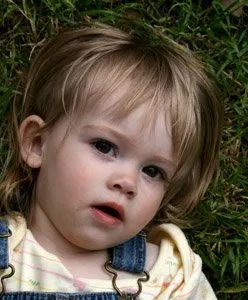
In Part 1 of Why Montessori Works, we discussed the intense phases of growth (physically, mentally, and emotionally,) experienced by all children, especially in the first 6 years of life. Maria Montessori called these phases "sensitive periods." A sensitive period is a critical window of opportunity during which children absorb certain concepts easily and naturally. In fact, as Maria Montessori explains, children under the age of 6 have amazingly absorbent, sponge-like minds. If these important windows of opportunity are missed, the information becomes significantly more difficult for the child to learn.
Dr. Montessori separated the "absorbent mind" stage into two parts: the unconscious phase and the conscious phase. From birth to age three, the child absorbs information unconsciously or unknowingly. He (or she) learns to sit, stand, walk, speak, etc., without conscious effort. The child is developing his basic "faculties" or functions through mimicry. Amazingly, children will absorb just about everything they are exposed to during this phase.
“Impressions do not merely enter a child’s mind; they form it.” ~ Maria Montessori
Also, Children are learning to control their hands and bodies in preparation for the next phase: the Conscious phase. Starting at about age 3, the child shifts into a more purposeful stage of development. Children still absorb information easily with "sponge-like minds," but now they are consciously seeking certain experiences. Children in this phase will tend to crave order, sequencing , early math, and music knowledge. They are predisposed toward learning letter shapes and sounds, which eventually leads to reading and writing skills. Additionally, they will continue to refine their control of movement, balance, and basic physical mechanisms during this phase.
Maximize Your Child's Potential during Sensitive Periods
According to Maria Montessori, children under the age of six experience 12 specific sensitive periods while their minds are still in this absorbent stage. To learn more about these sensitive periods, follow this link to Age of Montessori's free webinar entitled Stages of Development: Why It Matters!

Studies have shown that certain parts of the brain will not develop without stimulation during these early, formative years. As development is sequential, these early foundations are essential for incorporating concepts that are more complex.
In a study by professors Betty Hart and Todd R. Risley, called The Early Catastrophe: The 30 Million Word Gap by Age 3, research discovered the following: " Vocabulary use at age 3 was equally predictive of measures of language skill at age 9-10[....] Vocabulary use at age 3 was also strongly associated with reading comprehension scores on the Comprehensive Test of Basic Skills."
In other words, waiting until your child is six years old to start his or her education, is doing them a terrible injustice. As Maria Montessori said...
We cannot know the consequences of suppressing a child's spontaneity when he is just beginning to be active. We may even suffocate life itself. That humanity which is revealed in all its intellectual splendor during the sweet and tender age of childhood should be respected with a kind of religious veneration. It is like the sun which appears at dawn or a flower just beginning to bloom. Education cannot be effective unless it helps a child to open up himself to life.
To learn more about awakening your child's potential, please follow this link: Age of Montessori.





















